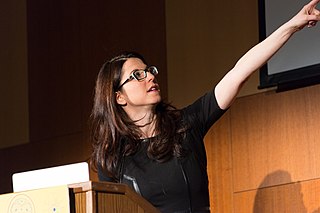Related Research Articles

Philosophy of psychology is concerned with the history and foundations of psychology. It deals with both epistemological and ontological issues and shares interests with other fields, including philosophy of mind and theoretical psychology. Philosophical and theoretical psychology are intimately tied and are therefore sometimes used interchangeably or used together. However, philosophy of psychology relies more on debates general to philosophy and on philosophical methods, whereas theoretical psychology draws on multiple areas.

Neuropsychology is a branch of psychology concerned with how a person's cognition and behavior are related to the brain and the rest of the nervous system. Professionals in this branch of psychology often focus on how injuries or illnesses of the brain affect cognitive and behavioral functions.
The British Psychological Society (BPS) is a representative body for psychologists and psychology in the United Kingdom.
Cognitive neuropsychiatry is a growing multidisciplinary field arising out of cognitive psychology and neuropsychiatry that aims to understand mental illness and psychopathology in terms of models of normal psychological function. A concern with the neural substrates of impaired cognitive mechanisms links cognitive neuropsychiatry to the basic neuroscience. Alternatively, CNP provides a way of uncovering normal psychological processes by studying the effects of their change or impairment.
Anthony David FMedSci is a British neuropsychiatrist based at University College London. Previously tenured as professor of cognitive neuropsychiatry and Vice Dean at the Institute of Psychiatry, King's College London, since 2018 he has been Director, University College London, Institute of Mental Health. He is the father of Rebecca David, a Senior Campaign Manager at Influencer LTD and Michael David a junior doctor.

The Institute of Psychiatry, Psychology and Neuroscience (IoPPN) is a research institution dedicated to discovering what causes mental illness and diseases of the brain. In addition, its aim is to help identify new treatments for them and ways to prevent them in the first place. The IoPPN is a faculty of King's College London, England, previously known as the Institute of Psychiatry (IoP).

Heather A. Berlin is an American neuroscientist and licensed clinical psychologist noted for her work in science communication and science outreach. Her research focuses on brain-behavior relationships affecting the prevention and treatment of impulsive and compulsive psychiatric disorders. She is also interested in the neural basis of consciousness, dynamic unconscious processes, and creativity. Berlin is host of the PBS Nova series Your Brain, the PBS series Science Goes to the Movies, the Discovery Channel series Superhuman Showdown, and StarTalk All-Stars with Neil DeGrasse Tyson.
Trevor William RobbinsCBE FRS FMedSci is a professor of cognitive neuroscience and the former Head of the Department of Psychology at the University of Cambridge. Robbins interests are in the fields of cognitive neuroscience, behavioural neuroscience and psychopharmacology.

The National Core for Neuroethics at the University of British Columbia was established in August 2007, with support from the Canadian Institutes of Health Research, the Institute of Mental Health and Addiction, the Canada Foundation for Innovation, the British Columbia Knowledge Development Fund, the Canada Research Chairs program, the UBC Brain Research Centre and the UBC Institute of Mental Health. Co-founded by Judy Illes and Peter Reiner, the Core studies neuroethics, with particular focus on ethics in neurodegenerative disease and regenerative medicine, international and cross-cultural challenges in brain research, neuroimaging and ethics, the neuroethics of enhancement, and personalized medicine.

Some of the research that is conducted in the field of psychology is more "fundamental" than the research conducted in the applied psychological disciplines, and does not necessarily have a direct application. The subdisciplines within psychology that can be thought to reflect a basic-science orientation include biological psychology, cognitive psychology, neuropsychology, and so on. Research in these subdisciplines is characterized by methodological rigor. The concern of psychology as a basic science is in understanding the laws and processes that underlie behavior, cognition, and emotion. Psychology as a basic science provides a foundation for applied psychology. Applied psychology, by contrast, involves the application of psychological principles and theories yielded up by the basic psychological sciences; these applications are aimed at overcoming problems or promoting well-being in areas such as mental and physical health and education.

Psychology encompasses a vast domain, and includes many different approaches to the study of mental processes and behavior. Below are the major areas of inquiry that taken together constitute psychology. A comprehensive list of the sub-fields and areas within psychology can be found at the list of psychology topics and list of psychology disciplines.
Clinical neuroscience is a branch of neuroscience that focuses on the scientific study of fundamental mechanisms that underlie diseases and disorders of the brain and central nervous system. It seeks to develop new ways of conceptualizing and diagnosing such disorders and ultimately of developing novel treatments.

Philippa Garety is Professor of Clinical Psychology and Clinical Director of the Psychosis Clinical Academic Group (CAG), South London and Maudsley NHS Foundation Trust. Garety specializes in the psychological understanding and treatment of psychosis and, in particular, delusions.

Elizabeth Alice Kuipers is a professor of psychology at the Institute of Psychiatry, King's College London, and was head of the Psychology Department from 2006- 2012. Kuipers is a consultant clinical psychologist and until 2012, had an honorary appointment at the South London and Maudsley NHS Foundation Trust, working as part of the psychosis community mental health team in Southwark. She is a founding director of the PICuP clinic and was the chair of the NICE Schizophrenia Guideline update 2007-9 and the Psychosis and Schizophrenia update 2011-2014
Vicki Anderson is an Australian clinical neuropsychologist and researcher. Since 2002 she has been the Theme Director of the Critical Care and Neurosciences group at the Murdoch Children's Research Institute in Melbourne, Australia, and she established the Australian Centre for Child Neuropsychological Studies at the Royal Children's Hospital.
Professor Susan Rossell is a British researcher based at Swinburne University of Technology specialising in Neuropsychology and Neuroimaging. Originally from Nottingham, UK; she now resides in Melbourne, Australia. Her research on the neuropsychology of schizophrenia and body dysmorphic disorder is internationally recognised.

The UCL Division of Psychology and Language Sciences is a Division within the Faculty of Brain Sciences of University College London (UCL) and is located in London, United Kingdom. The Division offers teaching and training and undertakes research in psychology and communication and allied clinical and basic science. It is the largest university psychology department in England.

Paolo Fusar-Poli is an Italian and British medical doctor, psychiatrist, and Professor at the Institute of Psychiatry, Psychology and Neuroscience, King's College, London and at the Department of Brain and Behavioral Sciences, University of Pavia.

Gemma Modinos, born 1980 in Castellar del Vallès, is a Spanish neuropsychologist. She works as a Reader of Neuroscience and Mental Health at the Institute of Psychiatry, Psychology and Neuroscience of King's College London. She is a Sir Henry Dale Fellow and a Group leader at the MRC centre for Neurodevelopmental Disorders at King's College London. She is the Chair of the Young Academy of Europe, where she directs European efforts to optimise science policy from a youthful perspective; and Junior Member of the Executive Board of the Schizophrenia International Research Society. She is known for her work revealing the role of emotion-related brain mechanisms in the development of psychosis and investigating how targeting these mechanisms can help design new therapeutic strategies.
References
- ↑ SLaM National Services: Our Experts Retrieved July 20, 2016
- ↑ UCL Profiles Vaughan Bell
- ↑ "National Services". National Services. Retrieved 12 May 2020.
- ↑ Erikson Institute Prize for Excellence in Mental Health Media Austen Riggs Centre, Retrieved July 20, 2016
- ↑ Mindhacks.com receives BPS Award BPS website, 19/11/2014
- ↑ Vaughan Bell. "Vaughan Bell". the Guardian.
- ↑ "Discover Magazine: The latest in science and technology news, blogs and articles - Authors". Discover Magazine.
- ↑ "Vaughan Bell". Slate Magazine.
- ↑ "Articles (Wired UK)". Wired UK.
- ↑ "Vaughan Bell - The Independent". The Independent. Archived from the original on 5 July 2015.
- ↑ The Atlantic: Vaughan Bell
- ↑ Giles, Jim (2005-12-15). "Internet Encyclopaedias Go Head to Head". Nature 438 (7070): 900–901. doi:10.1038/438900a. PMID 16355180.
- ↑ "Addiction Inbox". addiction-dirkh.blogspot.co.uk.